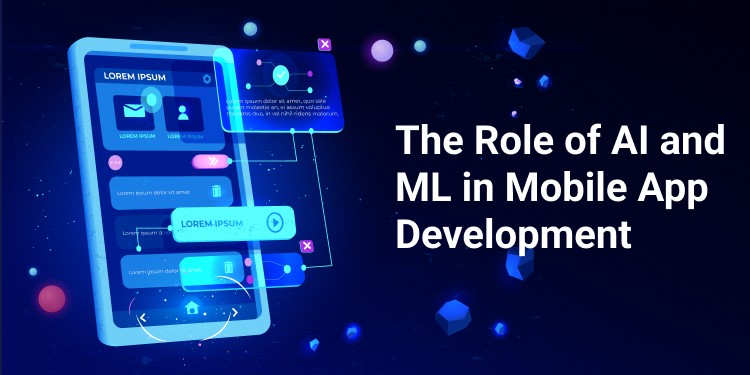
The Role of AI and ML in Mobile App Development
In today’s fast-paced digital ecosystem, AI and ML in mobile app development have become central to business success and user engagement. As user expectations grow for more personalized, responsive, and intuitive app experiences, machine learning and AI development services have emerged as transformative technologies in mobile app development.
By enabling apps to learn from user behavior, predict outcomes, and automate complex processes, AI and ML are redefining what mobile apps can do.
Understanding AI and ML in Mobile App Development
AI is the simulation of human intelligence in equipments created to think, learn, and resolve issues like a human would. Machine Learning – a branch of Artificial Intelligence uses algorithms that enable systems to learn from data and continuously improve their performance without explicit programming.
Integrate AI in mobile app development services to:
- Personalize user experiences
- Automate repetitive tasks
- Enhance app security
- Enable intelligent decision-making
- Improve app performance and reliability.
Let’s explore how these capabilities are revolutionizing mobile applications across industries.
1. Personalized User Experiences
One of the benefits of AI chatbots in mobile apps is delivering highly personalized experiences. ML algorithms can analyze user data, such as in-app activity, search queries, and purchase history, to create personalized content and recommendations.
Examples include:
- Music and video streaming apps recommend playlists or shows tailored to individual tastes.
- Fitness and health platforms have capabilities to adjust workout plans based on user progress and goals.
2. Intelligent Chatbots and Virtual Assistants
AI-powered chatbots and virtual assistants are becoming integral features in modern mobile applications. AI tools for mobile app development use natural language processing (NLP) and machine learning to understand user queries and provide real-time assistance.
- Customer support bots can resolve queries 24/7 without human intervention.
- Virtual assistants like Siri or Google Assistant help users schedule events, set reminders, or search for information.
- Banking and finance apps use chatbots to help users check balances, transfer money, or get spending insights.
3. Predictive Analytics for User Engagement
Predictive analytics is revolutionizing the way app developers and businesses anticipate user behavior. By leveraging machine learning models, it’s possible to analyze large volumes of historical and real-time data to accurately predict future user actions.
For instance:
- Retail apps can predict which products are likely to be purchased and trigger timely offers.
- Health apps can forecast potential health risks based on wearable data and user inputs.
- Gaming apps use predictive models to adjust difficulty levels or suggest in-game purchases.
These insights allow developers to proactively refine app features, improve UX, and increase monetization.
4. Enhanced App Security
Security is paramount in mobile app development. Identify and mitigate security risks with AI. Machine learning models can detect suspicious behavior, anomalies, or fraud attempts in real-time, enhancing data security in AI applications.
Key applications include:
- Biometric authentication using facial recognition or fingerprint scanning powered by AI for secure user access.
- Anomaly detection in financial apps to identify unauthorized transactions, boosting compliance and trust.
- Threat intelligence systems have adapt to strengthen security protocols.
These intelligent systems provide a dynamic layer of protection that evolves with new threats, while supporting CCPA compliance and GDPR compliance to ensure that user data is handled responsibly and transparently.
5. Automated Testing and Quality Assurance
Developing mobile apps typically requires intricate testing across a variety of devices, operating systems, and screen resolutions. AI tools for mobile app testing can accelerate this process through automated testing frameworks.
AI-based testing tools can:
- Simulate real-world user interactions
- Identify bugs and performance bottlenecks.
- Continuously improve test coverage based on historical outcomes.
AI tools and frameworks not only speed up app release cycles but also ensure a higher-quality product.
6. Smarter Search Functionality
AI and ML are improving search functionality within mobile apps by enabling voice-based search, image recognition, and contextual understanding.
- Voice search is becoming increasingly common in mobile apps, especially with the rise of voice assistants.
These features enhance user convenience and make the app more intuitive.
7. Real-Time Translation and Localization
If you want to target a global audience, implement features AI-powered language translation and localization. Apps like Google Translate use neural networks to deliver real-time translations with remarkable accuracy.
Similarly, AI can adapt content to fit cultural nuances, ensuring better user engagement in different regions. Leveraging AI for business strategy enables companies to scale internationally with ease, offering personalized experiences and effective communication across diverse markets.
This makes global expansion smoother and improves accessibility for non-native users.
Conclusion: A Smarter Future for Mobile Apps
AI app development has become a crucial part of next-generation mobile app. From delivering personalized user journeys and enhancing security to enabling intelligent automation, these technologies are redefining the mobile experience.
As AI capabilities continue to evolve, mobile apps will become even smarter, more intuitive, and deeply integrated into our daily lives.
For businesses, embracing ML and AI in mobile app development is not just a competitive advantage. Hiring a reliable mobile app development company will help you achieve your desired outcomes and stay relevant in today’s digital world.



 Bitcoin
Bitcoin  Ethereum
Ethereum  Tether
Tether  XRP
XRP  USDC
USDC  TRON
TRON  Lido Staked Ether
Lido Staked Ether  Cardano
Cardano  Avalanche
Avalanche  Toncoin
Toncoin  Wrapped SOL
Wrapped SOL